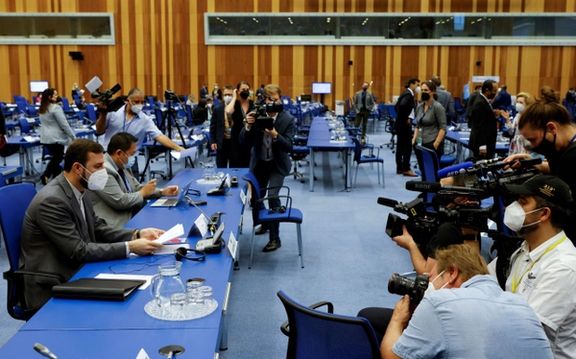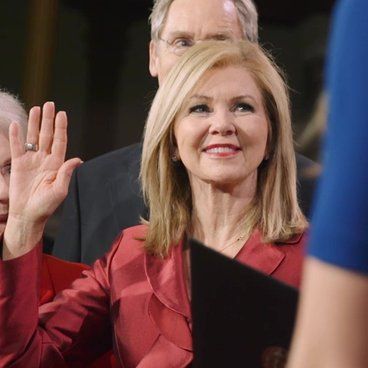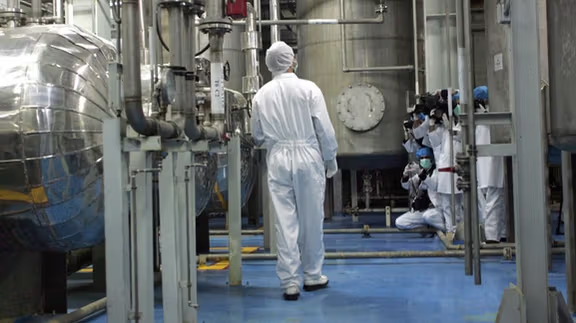Influential Senator Bob Menendez Calls For New Iran Strategy

“Hope is not a national security strategy,” Senator Bob Menendez (D-NJ) said on Tuesday speaking about Washington's Iran policy and ongoing nuclear talks.

“Hope is not a national security strategy,” Senator Bob Menendez (D-NJ) said on Tuesday speaking about Washington's Iran policy and ongoing nuclear talks.
At a dinner by the American Israeli Public Affairs Committee of New Jersey, Menendez stressed the need for a new Iran strategy and an end to year-long negotiations with Iran to restore the JCPOA.
“It is time to tell the Europeans, who[m] we have shown good faith with, that we were willing to enter into what was hopefully a stronger and longer deal, that the Iranians are not there,” Menendez said according to Jewish Insider.
Menendez, who is the chairman of the Senate Foreign Relations Committee, first expressed misgivings about the Biden Administration’s Iran approach in a speech on the Senate floor in early February.
Menendez revealed in his remarks that he has demanded a classified hearing to find out what the administration’s strategy is and said, “in the absence of hearing a plan in a classified setting, then I intend to create… legislation that will ultimately dictate what a plan should be.”
The powerful Senate Democrat demanded that Biden should enforce oil export sanctions currently on the books against Iran. Since Biden’s election Tehran has increased its oil exports to nearly one million barrels a day, mostly in illicit shipments to China.
He also emphasized the need for military deterrence against Iran, “to defend our people and our interests"

The United States continues to discuss with European states a possible censure of Iran at next week’s board meeting of the United Nations nuclear watchdog.
Ned Price, the US State Department spokesman, said Tuesday it was important for the UN’s International Atomic Energy Agency to follow up what it deems Iran’s inadequate explanations of past nuclear work as Washington consults with “allies and partners.”
But Price said Washington still wanted agreement with Tehran over reviving the 2015 Iran nuclear deal, the JCPOA (Joint Comprehensive Plan of Action).
Earlier discussions between the US and Europeans over rebuking Iran at the IAEA board have reportedly concluded this might undermine efforts to achieve agreement over the JCPOA in the year-long talks between Iran and six world powers in Vienna that paused in March.
Rafael Mariano Grossi, the IAEA chief, said in a report this week that Iran had failed to deliver so far on assurances made in March to satisfy the agency by late June over outstanding issues in its pre-2003 atomic work.
While Price noted that these “unresolved safeguards issues,” referring to Tehran’s basic obligations under the Nuclear Non-Proliferation treaty (NPT), were “separate” from paused talks to revive the JCPOA, a tweet earlier Tuesday from Israeli prime minster Naftali Bennett appeared designed to stymie efforts to revive the JCPOA. Bennett revealed documents from 2004-5 that he said showed Iran using stolen IAEA files to “systematically evade nuclear probes.”
“We have always said that outstanding safeguards issue…need to be resolved,” Price said. “We have done what we believe together with our IAEA partners to be most effective in confronting Iran’s nuclear activities, including what is very clearly its past nuclear deception, just as we work with the IAEA to determine whether we can achieve a mutual return to compliance with the JCPOA.”
‘The Iranians are not there’
Price reiterated that an agreement to revive the JCPOA depended on Iran dropping “demands that go beyond the JCPOA,” apparently referring to Tehran’s argument that the US should remove the Revolutionary Guards (IRGC) from its list of ‘foreign terrorist organizations,’ so reversing a decision taken by President Donald Trump in 2019 the year after he withdrew the US from the JCPOA.
But Price insisted that agreement on reviving the JCPOA was “absolutely still within reach.”
Senator Bob Menendez, the Democrat chairing the Senate Foreign Relations Committee, called Tuesday for an end to any talks to revive the JCPOA. Speaking to a dinner in New Jersey organized by the American Israel Public Affairs Committee (Aipac), which has opposed the JCPOA, Menendez said it was “time to tell the Europeans, who[m] we have shown good faith with, that we were willing to enter into what was hopefully a stronger and longer deal, that the Iranians are not there.”
Both supporters and opponents of the Biden administration’s approach claim their arguments are strengthened by the IAEA reporting this week that Iran has now 43.3kg (95lb) of uranium enriched to 60 percent, an increase of nearly 10kg (22lb) in three months.
While a nuclear weapon requires uranium enriched to 90 percent, the step from 60-percent enrichment is fairly straightforward. Under the JCPOA, Iran enriched only to 3.67 percent, but began expanding its nuclear program, and reducing cooperation with the IAEA, after the US left the JCPOA in 2018 and imposed ‘maximum pressure’ sanctions.

Small independent Chinese refineries are behind the surge in Iran’s oil revenues, says an advocacy group that works to expose those who help Tehran evade economic sanctions.
The Washington Free Beacon cited information obtained by United Against a Nuclear Iran (UANI) to reveal a network of Chinese petrochemical refiners, or "teapots," behind the upswing in illicit Iranian crude oil trade, saying they provided the Islamic Republic with at least $22 billion in revenue since President Joe Biden took office.
These Chinese private firms, which are not state-controlled, are primarily responsible for "funding this illicit and uniquely lucrative trade" with Iran, the report said, adding records seen by the UANI detailed at least 40 different shipments of Iranian oil to China dating back to 2019.
The information about small refiners buying Iranian oil is not new but the details in UANI’s report shed further light on the illicit trade.
"Since the US has in fact sanctioned Chinese state-owned imports in the past, such as Zhuhai Zhenrong, the decision to import Iranian oil via dozens of small unaffiliated ‘non-state' firms helps obscure the Chinese government's role and protect its own big firms from scrutiny, accountability, and attendant sanctions," a brief issued said.
Earlier in the year, Bloomberg said teapot refineries have benefited from Washington’s sanctions on Iran and Venezuela because they bargain for more discounts while other buyers have stopped purchases in fear of the US financial system freezing their assets.

A group of Republican lawmakers have reintroduced the Iran China Accountability Act aimed at prohibiting a nuclear deal until Tehran terminates ties with China and groups like Hamas.
Senator Mary Marsha Blackburn of Tennessee led the legislation jointly with Senators Rick Scott (R-Fla.), Bill Cassidy (R-La.), Marco Rubio (R-Fla.), Thom Tillis (R-N.C.), Mike Braun (R-Ind.), and Ted Cruz (R-Texas), while Congressman Bob Good (R-Va.) introduced the House version of the bill.
The bill is to impose certain requirements for the renegotiation or reentry into the Joint Comprehensive Plan of Action (JCPOA) or other agreements relating to Iran’s nuclear program, until the Islamic Republic can ensure the national security interests of the US and its allies are protected, by terminating strategic, security and military partnerships with China and stopping transfers of cash to proxy forces, including Hamas.
“The Obama-Biden Iran Deal has always been a failure. The Biden administration should not re-enter a deal that legitimizes the Iranian regime — especially while they continue to fund terrorism, endorse Communist China’s dangerous government, and facilitate genocide.
Describing Iran and China as two of America’s greatest adversaries that cannot be trusted, Senator Scott said, Iran chants ‘death to America’ and wants to destroy our great ally, Israel. Communist China will stop at nothing in its quest for world domination. These dangerous regimes, clearly emboldened by President Biden’s appeasement and desperate desire to re-enter the failed Iran nuclear deal, are working to gain a critical foothold in the Middle East.

Pressure is growing on Iran ahead of the United Nations nuclear watchdog’s 35-nation board meeting next week with the agency dissatisfied at Tehran’s cooperation.
France's foreign ministry on Tuesday urged Iran to assuage concerns reiterated Monday over Iran’s pre-2003 nuclear work in a report by the UN’s International Atomic Energy Agency director-general Rafael Mariano Grossi.
Israeli Prime Minister Naftali Bennett Tuesday tweeted several Iranian documents from 2004 and 2005, which he said Israel had acquired, that showed Iran had stolen IAEA classified documents and used the information to “systematically evade nuclear probes.” Bennett also tweeted an animation with green-uniformed, bearded Iranians hiding nuclear bombs from a blond-haired nuclear inspector.
One of the documents released by Bennett is a series of Iranian comments on a September 2005 report by then IAEA director-general Mohamed ElBaradei, which included his analysis of Iran’s -pre-2003 nuclear research. ElBaradei noted that while “good progress” had been “made in Iran’s correction of the breaches” in adherence to the Nuclear Non-Proliferation treaty (NPT), the agency would continue to press Iran for further explanations given its “experiments to acquire the know-how for almost every aspect of the fuel cycle” and “policy of concealment…until October 2003.”
The Iranian comments released by Bennett, in Persian and English translation, expresses Iran’s view that Tehran was under no legal obligation to answer queries it said were unrelated to the nuclear program therefore its commitments under the NPT.
Current IAEA director-general Grossi said in a report this week that Iran had so far failed to meet an agreement, made this March, to satisfy the agency over outstanding issues on this pre-2003 work with written replies by late March and answers to subsequent queries by June 21.
‘Obtained by intelligence measures’
Other documents, dated 2004, attached to Bennett’s tweet refer to ‘confidential’ IAEA material “obtained by intelligence measures,” suggesting that Iran had some prior knowledge of what agency inspectors might investigate.
These include notes on the need to change dates concerning the liquidation of Kimiya Maadan, a company managing a uranium mine, although quite how this affected the agency’s work remains unclear. The Wall Street Journal, which had earlier access to the documents tweeted by Bennett, cited “Middle Eastern intelligence officials” claiming that altering the date “allowed Iran to tell the IAEA that the work on the uranium mine, before May 2003, was done by Kimiya Maadan for the Atomic Energy Organization of Iran, supporting Iran’s assertion that the mine was civilian and separate from any military nuclear work.”
The Journal cited “Middle Eastern intelligence officials and former IAEA officials” that “Iran’s Ministry of Defense built the uranium mine, called Gachin, to be able to produce material for a potential nuclear-weapons program…”
‘Digging up old cases’
The 2005 ElBaradei report, while noting there were “no indications of undeclared mining or milling activities at Gahine [sic],” said the IAEA was “trying to achieve a better understanding of the complex arrangements governing the past and current administration of the Gchine mine and mill…[including] …how a turn-key project for a uranium ore processing plant could have been implemented by a newly founded company…in such a relatively short period of time.”
The purported Iranian comments on the ElBaradei report released by Bennett suggested the agency was “digging up old cases” and noted its interest in Tehran’s alleged “ties with a smuggling network.” Some analysts have long suggested that Iran before 2003 acquired equipment, including centrifuge parts, from the Pakistani nuclear scientist AQ Khan.

Iran’s Tuesday dismissed as “unfair and unbalanced" a report by the UN nuclear watchdog accusing Tehran of lack of cooperation over its past atomic activities.
In a press conference in Tehran, spokesman Saeed Khtibzadeh insisted that the International Atomic Energy Agency’s (IAEA) report disclosed on Monday does not reflect “the reality of discussions between Iran and the Agency.”
The IAEA report expressed dissatisfaction in Iran’s answers to questions over its past atomic activities. Iran agreed March 5 to provide written explanations by March 20 of long-standing issues in its nuclear work before 2003, and to clear up remaining queries by June 21. But the new quarterly report by IAEA expresses dissatisfaction with Iran’s response to agency queries over four sites not declared as part of the nuclear program where inspectors detected traces of uranium.
"Iran has not provided explanations that are technically credible in relation to the Agency's findings at those locations," the report said. Mohammad Eslami, the head of the Atomic Energy Organization of Iran, said in April that Tehran had answered all the agency’s questions.
Khatibzadeh accused the IAEA of “politicizing” the issue and allowing pressures by “Zionists and some activists” to divert the agency’s response from a technical to a political one.
Khatibzadeh also was defiant on the issue of stalled nuclear talks with the United States, repeating Tehran’s position that Washington should make decisions to reinvigorate the negotiations in Vienna,
The diplomatic process was said to be close to fruition in early March when diplomats suddenly stopped the talks and returned to their capitals. One issue that has since been repeatedly mentioned as a major stumbling block is Iran’s insistence that its Revolutionary Guard (IRGC) should be removed from the US list of Foreign Terrorist Organizations (FTO).
The Biden administration has so far refused the demand, specially as domestic and Congressional pressure increased in March and April by those opposed to making concessions to Tehran for reviving the 2015 nuclear deal known as the JCPOA.
Khatibzadeh, however, tried to downplay the importance of the IRGC delisting issue, insisting that more important and all-encompassing is Iran’s economic benefits from an agreement. “Issues that are being negotiated between Iran and America are related to Iran’s potential economic benefits and lifting of all components of US maximum pressure,” the spokesman said.
Tehran has been lately downplaying the IRGC issue in the talks, perhaps partly because of its domestic ramifications amid increasing economic hardships for the average citizen. Iranians know that if there is a nuclear deal, economic sanctions would be lifted, and their living conditions would be improved somewhat. The authorities do not want the IRGC to be seen as the stumbling block to an agreement.
However, the powerful military and intelligence organization is also a major economic player in Iran and even if US oil export and banking sanctions are lifted, hundreds of companies linked with the IRGC would be seen as risky partners for foreign businesses and potential investors.
Besides IRGC’s FTO listing, dozens of companies and individuals linked with the Guards have been sanctioned by the US.
“What we should ultimately gain from an agreement is definite benefits for the Iranian people,” Khatibzadeh said and added, “Issues that remain between us and America are about guarantees, individuals and the cycle of Iran’s economic profits, which need to be implemented.”